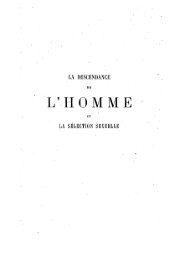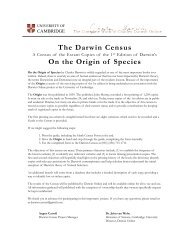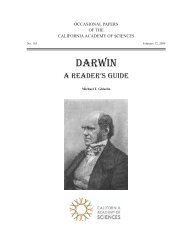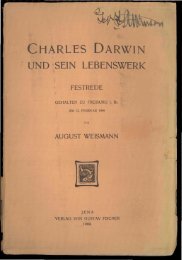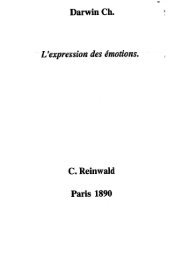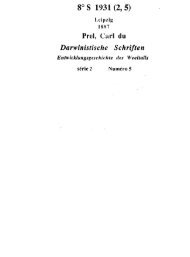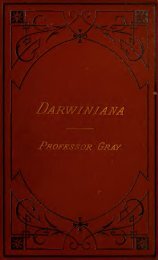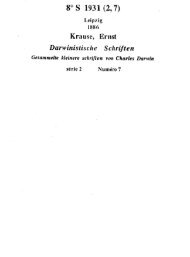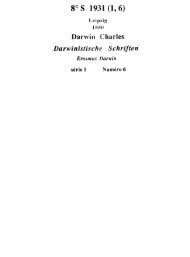Charles Darwin's Cambridge Life 1828-1831 - The Complete Work ...
Charles Darwin's Cambridge Life 1828-1831 - The Complete Work ...
Charles Darwin's Cambridge Life 1828-1831 - The Complete Work ...
You also want an ePaper? Increase the reach of your titles
YUMPU automatically turns print PDFs into web optimized ePapers that Google loves.
Journal of <strong>Cambridge</strong> Studies<br />
6<br />
separately in the College accounts for each student. For example, in the quarter ending Lady Day<br />
(25 March) 1830 Darwin was charged £4.12.6 for coal, 7 shillings for the shoeblack and £2 one<br />
shilling for the barber.<br />
A typical day at Christ’s College for Darwin probably began around 7am when he was awoken by<br />
Impey in time to dress for Chapel at 7.30. While attending Chapel the bedmaker would come in and<br />
make the bed. This too was charged on the account, in this case £1 one shilling for the same quarter.<br />
Darwin would return from Chapel and have breakfast in his room before a blazing coal fire with the<br />
kettle boiling on the grate. <strong>The</strong> table was laid by Impey and the College breakfast, according to the<br />
recollection of a near contemporary at Trinity, consisted of: “the fourth part of a half-quartern loaf,<br />
and twopenny-worth of butter”. ([Atkinson] 1825, p. 507) Tea and coffee and any other extras were<br />
provided or paid for by the student. After breakfast Impey cleared the breakfast things.<br />
Clearly a wide variety of activities took place in Darwin’s rooms. He read for his College curriculum,<br />
wrote letters, compared his captured beetles with published descriptions in his copy of Stephens<br />
Systematic catalogue of British insects and carefully pinned the beetles to cork boards. He had<br />
friends to coffee, and in the evenings they sometimes dined there and would then drink wine and<br />
play cards. Darwin recalled in his Autobiography, p. 61: “I used generally to go by myself to King’s<br />
College, and I sometimes hired the chorister boys to sing in my rooms.” Herbert remembered<br />
accompanying Darwin to the afternoon service at Trinity “when we heard a very beautiful anthem<br />
— At the end of one of the parts, which was exceedingly impressive, he turned round to me & said<br />
with a deep sigh “How’s your backbone?” (Herbert 1882)<br />
Even before coming up to <strong>Cambridge</strong> Darwin was a passionate sportsman. In October <strong>1828</strong><br />
Darwin’s father and sisters contributed £20 towards the purchase of a new double barrelled shotgun.<br />
With it Darwin often went shooting in the surrounding fens. He also acquired a dog named Dash.<br />
About this time, Herbert recalled that he and Darwin had an “earnest conversation about going into<br />
Holy Orders; & I remember his asking me with reference to the question put by the Bishop in the<br />
Aduration service: “Do you trust that you are inwardly moved by the Holy Spirit &c” whether I<br />
could answer in the affirmative—: & on my saying “I could not,” he said “neither can I, &<br />
therefore…I can not take orders.” (Herbert 1882) However in a letter from May 1830 Darwin wrote<br />
to Fox “I have some thoughts of reading divinity with [Henslow] the summer after next.”<br />
(Correspondence, vol. 1: 104)<br />
Chapel<br />
Members of the College were called to Chapel by the bell, which rang for five minutes as the start<br />
of services approached at 7.30am. Students were probably required to attend Chapel eight times per<br />
week, at least one service per day and twice on Sunday. Undergraduates probably rotated through<br />
Chapel readings. It is interesting to note, and it seems no biography has ever done so, that <strong>Charles</strong><br />
Darwin may well have stood at the lectern in Christ’s College Chapel and read from the Bible.<br />
Far from being an establishment-defending and entrenched Anglican stronghold Christ’s had a large<br />
percentage of reform-minded Fellows. “In 1837 a draft of a new body of statutes was made, and on<br />
24 February 1838 an order was signed by the Master and ten Fellows (including Shaw, Baines, and J.<br />
Cartmell, the future Master) that a petition for the substitution of [the Elizabethan] Statutes should<br />
be presented to the Queen. … [the draft statutes] seem to have permitted the marriage of Fellows,<br />
and some participation in College emoluments by persons not members of the Church of<br />
England. …Divine service should be held on Sundays only in the College chapel…” (Peile 1900, p.<br />
279) and so forth. However, the draft was unsuccessful. Darwin’s tutors, Shaw and Graham, are<br />
buried in the ante-chapel. <strong>The</strong>ir Latin-inscribed tombestones in the floor can still be read today.



![[180] XXX. Notes on the Eflécts produced by 25720 Ancient Glaciers](https://img.yumpu.com/49145077/1/144x260/180-xxx-notes-on-the-eflects-produced-by-25720-ancient-glaciers.jpg?quality=85)
